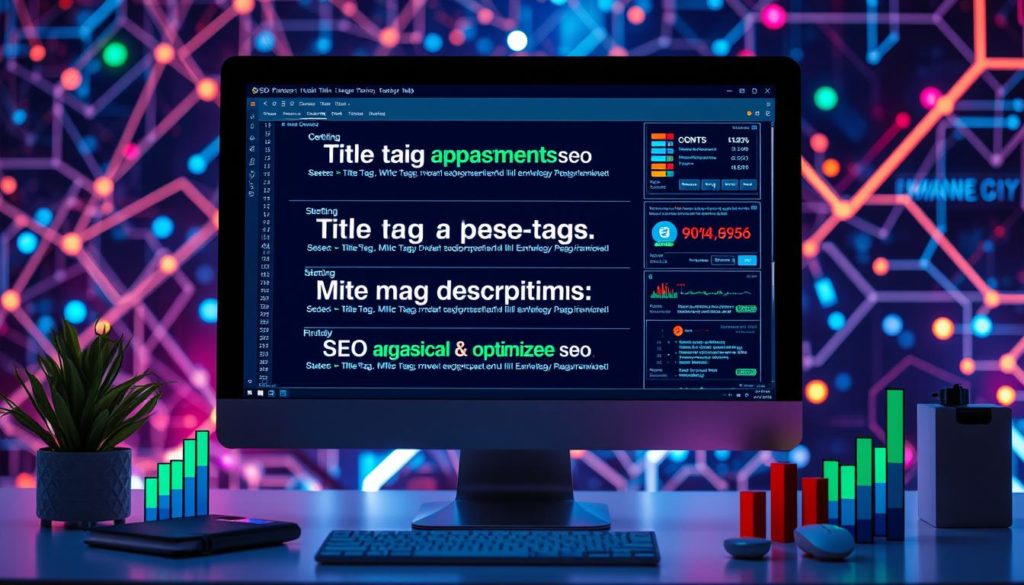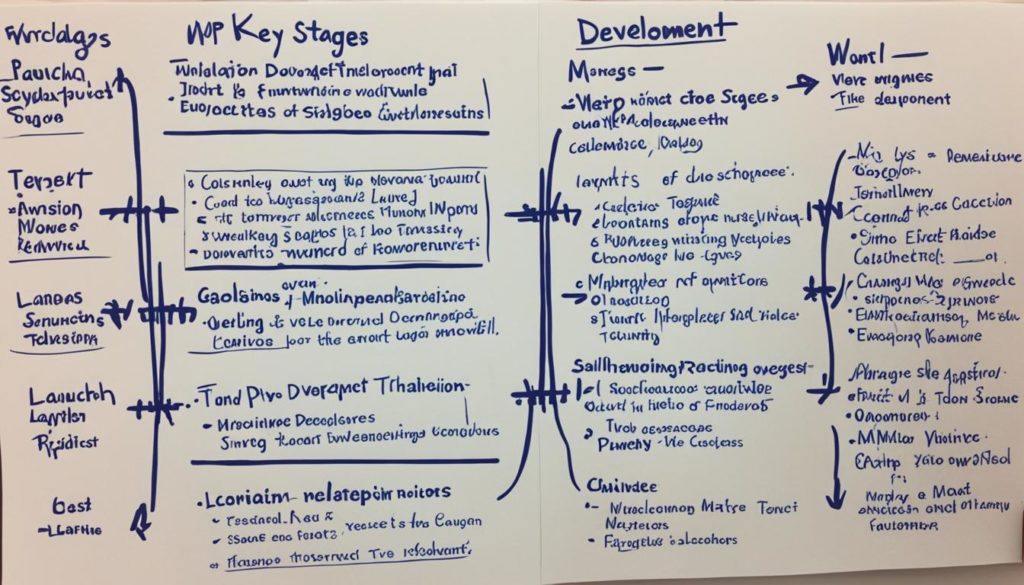
Did you know over 75% of users never look past the first page of search results? This fact shows how vital SEO is for getting your site noticed. Using the right SEO tips can help your site rank higher, bringing in more visitors and boosting your authority.
Creating top-notch, relevant content is key to SEO success. We focus on using the right SEO keywords, updating content often, and optimizing metadata like title tags and descriptions. Adding great on-page SEO elements also helps improve your site.
User experience is also very important. Making sure your site works well on mobiles, loads fast, and using the latest SEO tech is crucial. Tools like Google Search Console give us insights to make our SEO better over time.
While off-page SEO, like getting quality backlinks, is important, we focus on making real, valuable content. This builds trust in your brand and helps you grow naturally. By following these best practices, we lay a strong base for long-term SEO success.
Key Takeaways
- High-quality, relevant content is essential for successful SEO.
- Accurate keyword integration and frequent content updates boost visibility.
- Optimizing metadata, including title tags and descriptions, is critical.
- Prioritizing user experience with mobile responsiveness and quick load times is crucial.
- Utilizing tools like Google Search Console helps monitor and improve SEO rankings.
Want to learn more about on-page SEO? Check out here and start making your site a top performer.
On-Page SEO: Foundations for Success
Building a strong on-page SEO foundation is key to boosting visibility and organic traffic. By optimizing various web page elements, we can greatly improve our search engine rankings.
Content Quality and Relevance
Content quality and relevance are vital in on-page SEO. We must create content that answers users’ questions well. For instance, making articles that cover topics like “how to apply for scholarships?” or “what is biomedical engineering?” helps us meet our audience’s needs.
By focusing on unique and informative content, we naturally use SEO keywords. This is important for keeping high rankings.
Keyword Placement and Density
Strategic keyword placement helps search engines and users see our content’s main topic. Using keywords in the page URL, title, headings, and content boosts its visibility. But, it’s important not to overdo it.
Too many keywords can lead to penalties, while too few might hurt our rankings. Tools like Semrush’s On-Page SEO Checker help us fine-tune our keyword strategy for the best balance.
Optimizing Title Tags and Meta Descriptions
Title tags and meta descriptions are key for on-page optimization. Crafting title tags with SEO strategies can greatly increase click-through rates. Also, writing compelling meta descriptions with main keywords makes the page’s content clear to users and search engines.
Keeping these metadata updated keeps our content relevant and engaging. Well-defined and relevant search results get more clicks, which means more organic traffic for our pages.
The Role of Technical SEO
Understanding the importance of technical SEO is key to making a website more visible and improving user experience. It means doing a detailed SEO audit to find and fix technical problems.
Improving Site Speed and Performance
Making your site faster is crucial for a good SEO strategy. Slow sites can make users leave quickly, hurting your rankings and traffic. To speed things up, compress images, use light themes, and add lazy loading when needed. These steps make your site faster and keep more users happy.
Ensuring Mobile Responsiveness
Google now looks at mobile versions of websites first, so making sure your site works well on mobile is vital. A good SEO check should include checking how mobile-friendly your site is. Make sure images load fast on mobile and content fits well on small screens. A site that works great on mobile helps with your technical SEO and makes users happy.
Using Schema Markup
Using Schema.org markup is a technical SEO trick that helps search engines understand your content better. This markup can lead to rich snippets in search results, making your site more visible and getting more clicks. Having a clear URL structure and organized content also boosts the effect of Schema.org markup.
Best Practices for SEO: Effective Strategies
Starting with thorough keyword research is key to good SEO. We find out what our audience looks for and use those keywords in our content. This makes our content more visible online.
Keyword Research Techniques
Keyword research is the base of a strong SEO plan. By knowing what our audience searches for, we can make our content more visible. Tools like Google Keyword Planner and Ahrefs help us find keywords with a lot of traffic.
We should focus on long-tail keywords. They show more specific searches and have less competition.
Building Quality Backlinks
Getting a lot of good backlinks is key for our website’s trust and authority. Getting backlinks from well-known blogs and publications helps a lot. Ways to get these links include guest blogging, being part of expert roundups, and making strategic partnerships.
Monitoring and Updating Content
Keeping an eye on our content is crucial for SEO success. Tools like Google Search Console help us fix indexing problems. This makes sure our content is seen and ranked correctly.
Keeping our content fresh with new info and SEO updates helps us stay visible online.
- Use different keyword tools for better insights.
- Get quality backlinks from trusted sources.
- Keep an eye on and update your content often for the best results.
| SEO Strategy | Key Focus | Benefits |
|---|---|---|
| Keyword Research | Identify high-traffic, relevant terms | Improved search visibility |
| Quality Backlinks | Secure links from reputable sources | Enhanced authority and credibility |
| Content Monitoring | Regular updates and error corrections | Consistent search engine performance |
Utilizing SEO Tools and Analytics
In today’s digital world, using advanced SEO tools and systems like Google Search Console is key. These tools help us track how well a website is doing. They give us data on views, clicks, and how users behave. This info lets us make smart changes to our SEO plans. For example, analyzing organic traffic shows which pages get the most attention, helping us improve content.
Google Analytics is also crucial for understanding what users like and how it affects rankings. We can check how fast pages load and how easy they are to navigate. This helps us make them better. Also, we can improve internal links and make images better for SEO based on what the analytics say.
Here’s a look at some top SEO tools and what they offer:
| SEO Tool | Key Features | Advantages |
|---|---|---|
| Google Search Console | Performance Data, Index Coverage | Free, Works well with Google Analytics |
| SEMrush | Keyword Research, Competitor Analysis | Deep insights, Easy to use |
| Ahrefs | Backlink Analysis, Site Audit | Great for backlink info, Powerful tools |
Tools like SEMrush and Ahrefs are great for boosting SEO. They help us keep an eye on content and give us lots of info on keywords and competitors. By using these insights, we can get more people to visit our site, making it more successful.
In short, using SEO tools and doing deep organic traffic analysis are key to getting better search rankings. They help us keep improving our site’s visibility and how engaging it is for users.
Conclusion
As we finish this guide on SEO, remember, a complete approach is key. It’s all about mixing content quality and relevance with strong technical SEO and smart keyword use. We’ve seen how important it is to make titles better, speed up sites, and make them work well on mobiles to improve user experience and rank higher.
Also, building good backlinks and keeping content fresh is crucial. Using SEO tools and analytics helps us see how we’re doing and how to get better. Keeping up with new strategies and following Google’s content rules keeps our SEO strong, adapting to changes in digital marketing.
The main idea of giving value to users and making a great online experience stays the same, even as SEO best practices change. By actively managing our sites and always improving, we’re setting up for long-term success in search rankings and keeping our sites visible online.
FAQ
What are the best practices for SEO to improve search engine rankings?
To boost your SEO, focus on creating top-notch, relevant content. Place keywords smartly and optimize your metadata. Make sure your site is mobile-friendly and fast. Use Schema Markup and keep your content fresh.
How can on-page SEO improve my website’s search engine ranking?
On-page SEO boosts your site by improving content quality and keyword placement. It also means optimizing meta tags. This makes your pages more visible and relevant to search engines.
What is the significance of technical SEO?
Technical SEO makes your site faster and more mobile-friendly. It uses methods like image compression and Schema.org markup. These improve crawl rates and user experience, helping your rankings.
How can we perform effective keyword research for SEO?
Start by finding key phrases your audience uses and understand their search intent. Use tools like Google Keyword Planner to find valuable keywords for your content.
What are some strategies for building quality backlinks?
For quality backlinks, create valuable content and guest blog. Get links from reputable sources and use social media. These strategies boost your site’s authority and credibility.
Why is it important to monitor and update content regularly?
Keeping content fresh is key for staying relevant and accurate. Updates help adapt to new info, trends, and SEO practices. This keeps your rankings up and engages users better.
What role do SEO tools and analytics play in search engine optimization?
SEO tools and analytics give us insights into our site’s performance. They show us impressions, clicks, and how users behave. This info helps us make better SEO choices.
How does mobile responsiveness impact SEO?
Being mobile-friendly is crucial as search engines favor such sites. Optimizing for mobile improves user experience. It’s key for better rankings in a mobile-first world.
What is Schema Markup, and how does it benefit SEO?
Schema Markup is a way to add microdata to our content. It helps search engines understand our content better. Using Schema can lead to rich snippets in search results, boosting visibility and clicks.
Future App Studios is an award-winning software development & outsourcing company. Our team of experts is ready to craft the solution your company needs.










